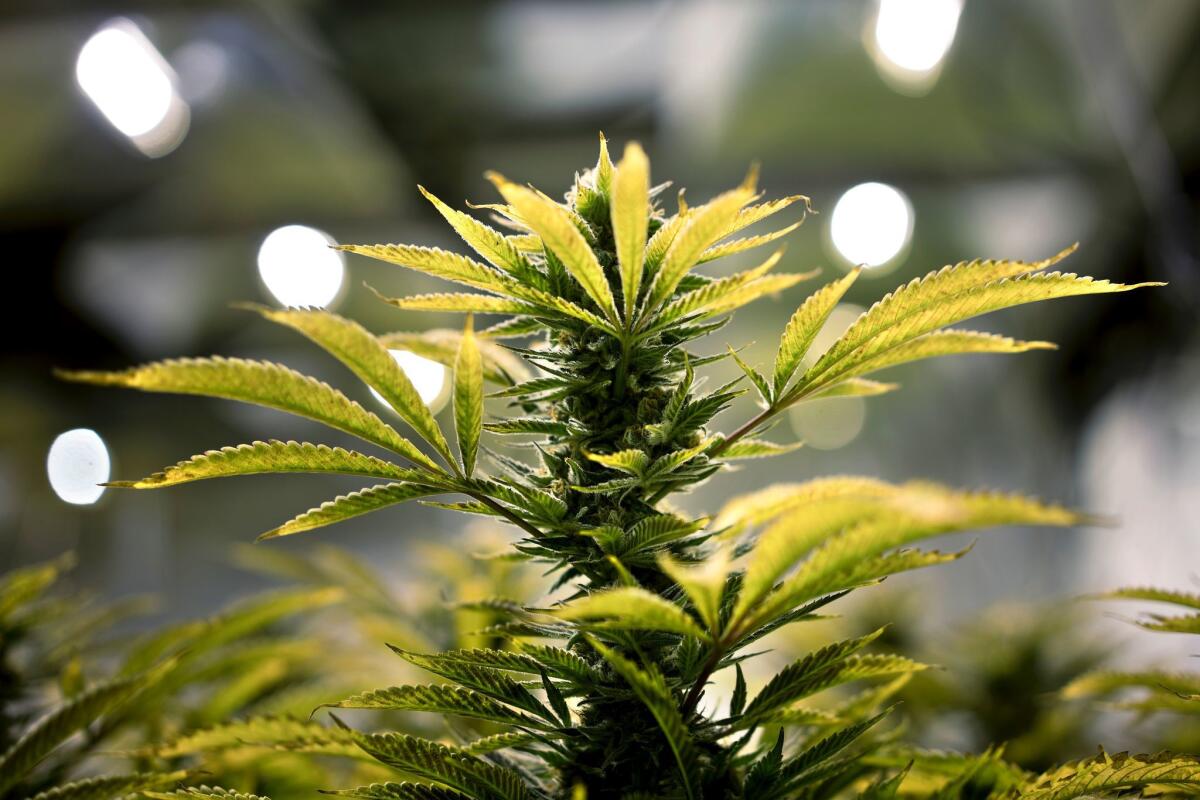The Whiteboard Jungle: The potential side effects of legalization

A marijuana plant is shown at Alternative Solutions, a medical marijuana producer in Washington D.C., in this file photo taken on April 19, 2016.
Before you vote for Proposition 64 that would legalize recreational marijuana, read over the 32 pages in the state’s Official Voter Information Guide. You may change your mind.
Like a tsunami that transforms the landscape, expect life to change: more impaired people on the job, on the roads and on public assistance for health issues related to the drug.
Look for marijuana ads to appear on television, on radio, on billboards.
Watch for swaths of agricultural areas to start growing cannabis instead of vegetables.
Join the conversation on Faecbook >>
Get ready for pot stores to pop up all over town. Proposition 64 mandates no establishment can be within 600 feet of a school or day care center. That’s the length of four city blocks. Children will walk by the pot outlets, guaranteed.
Considering that the vast majority of Americans do not use marijuana, it is bewildering why voters would legalize something that is detrimental to the health of society.
Why would citizens who view cigarette smokers as lepers put out the open-house sign for marijuana smokers? I thought Californians were health conscious.
The state still lists marijuana as a carcinogen. Tax dollars should not be used to approve the sale of more cancer-causing substances.
What concerns “No on Prop. 64” campaign spokesman Andrew Acosta the most is “how little people know about the industry” that they are about to legitimize, an industry involving investors whose sole desire is to make money cultivating and distributing a drug.
California, having lost companies to less regulated states, is on the verge of a new gold rush. Instead of third-world nations delivering drugs to the world, it will be California.
It has taken 20 years for Sacramento to figure out how to properly regulate the medical marijuana industry. Proposition 64 allows only one year to get it done correctly for recreational use.
“The only reason that California is rushing into legalization is to make money for the industry,” Acosta said.
The New York Times reports that “the market for both recreational and medicinal marijuana is projected to grow to $22 billion in four years, from $7 billion this year if California says yes.”
Steve DeAngelo, who runs a marijuana dispensary in Oakland, told the newspaper that “my ultimate objective is to get this plant into the hands of every single human being on the planet,” calling marijuana “a religious, spiritual thing.”
This is the mentality of those who are pushing legalization.
Just like tobacco companies, these firms care only about money, uninterested in the repercussions to our society.
A study from the AAA Foundation for Traffic Safety found that fatal traffic accidents involving drivers who used marijuana more than doubled in the state of Washington since the drug was legalized.
And the National Highway Traffic Safety Administration reports that nationwide nighttime weekend drivers high on marijuana increased almost 50% from 2007 to 2014.
The AAA Foundation says that “there is currently no scientific way to predict impairment due to marijuana based on a blood test result.” Still, voters are willing to roll the dice that eventually a test for impairment will magically surface as we use the streets and people as experiments.
Proponents of Proposition 64 have faulty arguments.
That legalization will make the illegal market go away. Not true. In Colorado, the black market for marijuana has increased after legalization.
That young people will be protected from trying the drug since the initiative stipulates that edibles cannot appeal to young people. “No” to lollipops and gummies, but “yes” to cookies and brownies.
That passing Proposition 64 will stop the incarceration of people caught with marijuana. False. If you think our prisons are full of potheads, you probably are smoking something.
- That marijuana is not harmful. Wrong again. You don’t need a medical degree to know that smoking anything is not healthy.
Brains are not fully developed until age 25. But at age 21, a person can start using marijuana, a drug that remains in the body’s tissues, including the brain.
Last week, “60 Minutes” aired a segment on the negative impact legalized pot has had in Colorado. One doctor described a spike in babies born with traces of THC.
While I don’t want to put the potheads in jail, I do not want the government to validate their drug habit. Leave the “look-the-other-way” system currently in place alone — no change necessary.
Someone who chooses to abuse their body does not have a right to harm society.
--
BRIAN CROSBY is a teacher in the Glendale Unified School District and the author of “Smart Kids, Bad Schools” and “The $100,000 Teacher.” He can be reached at briancrosby.org.
